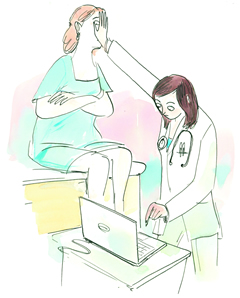Kevin Leonard, an information systems expert at U of T’s Department of Health Policy, Management and Evaluation, has suffered from Crohn’s disease for much of his life. As someone with a chronic condition, he has endured not only painful symptoms and side-effects of drugs, but also the proliferation of caregivers, each of whom maintains a paper-based medical record documenting his condition. He’s long believed such an information system is “cumbersome, slow and costly.”
In recent years, Leonard’s advocacy organization, Patient Destiny, has been organizing conferences bringing together patients and health-care providers to promote the “one patient, one record” principle as a means of improving outcomes for the growing number of individuals with chronic conditions. A single, comprehensive, web-accessible health record, he argues, would allow patients to monitor their own conditions better, prevent emergencies and reduce health spending. The result, Leonard predicts, will be “significant cost savings” because patients with chronic conditions consume 70 to 80 per cent of health budgets.
But while he’s a proponent of digitizing patient records and then building electronic networks that can share everything from test results and prescriptions to digital imaging, Leonard felt the vision of Ontario’s eHealth agency was “incomplete,” and driven by the needs of health providers, not patients. Following a multimillion-dollar contracts scandal at eHealth last year, the agency has done a major rethink, says Leonard. “That’s a good thing.”
Experts have long debated the form, content and functionality of electronic health records. Should they include generic but authoritative health information or email options allowing patients to communicate directly with their physicians? What kind of security is required if the record can be accessed like an online bank account? Comprehensive systems now exist in Denmark and inside California’s giant Kaiser Permanente health management organization.
But Canada’s medical establishment, Leonard says, has long resisted giving patients unfettered access to their health records, even though courts have established that an individual’s record is not the exclusive property of a hospital or physician. Many doctors, including former eHealth Ontario advisors, believe patients aren’t “mature enough” to see unedited versions of their own medical records, Leonard notes.
From his perspective, Ontario’s new eHealth administrators should begin from the premise that patients have the right to access all the information – tests, digital images, diagnostic options – that end up in any new eHealth system. When individuals can go to their own secure portal and check their latest test results, participate in online patient support groups or exchange emails with their physicians, they become less passive consumers of medical advice, he says.
Leonard points to Sunnybrook Health Centre’s “MyChart” system as an example of what’s possible. The five-year-old system allows Sunnybrook patients to go to their own password-secured online account from any computer and retrieve information such as clinic visit notes, results of tests done at Sunnybrook and personal and family health details. They can also request appointments and prescription refills by email.
Sunnybrook chief information officer Sam Marafioti (MSW 1977 St. Michael’s), a guest lecturer in the Faculty of Medicine, believes that Ontario’s eHealth system will evolve through the expansion of local systems, such as MyChart, rather than the construction of a large central network. He says eHealth’s role is to develop standards and the backbone, and then facilitate the creation of more MyCharts by local or regional health institutions. “It will only succeed when bottom- up meets top-down.”
Leonard, who has been urging Marafioti to publish data on how MyChart has affected patient outcomes, agrees. “There are not enough competing products,” he says. “We need to do more projects to find out what works and what doesn’t work.”
Recent Posts
For Greener Buildings, We Need to Rethink How We Construct Them
To meet its pledge to be carbon neutral by 2050, Canada needs to cut emissions from the construction industry. Architecture prof Kelly Doran has ideas
U of T’s 197th Birthday Quiz
Test your knowledge of all things U of T in honour of the university’s 197th anniversary on March 15!
Are Cold Plunges Good for You?
Research suggests they are, in three ways





